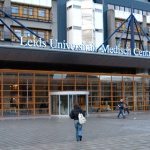
Montpellier, France, February 5th, 2016. SurgiMab announces the launch of a phase I clinical trial program evaluating the safety and performance of its fluorescent conjugate SGM-101 in patients with pancreatic or rectal cancer.
SurgiMab, founded in 2011 in Montpellier, France, is developing near-infrared fluorescent conjugates as in vivo diagnostic agents in oncology. “Today we are proud to announce that the Centre for Human Drug Research and the Leiden University Medical Center have started patient inclusion in a phase I clinical trial that will allow to assess both the safety and the efficacy of our tumor-targeted product SGM-101 in patients with pancreatic or rectal cancer.” Dr. Alexander Vahrmeijer, Principal Investigator of this study, is a renowned key-opinion-leader in intraoperative fluorescence imaging. He is confident that “a targeted fluorescent agent such as SGM-101 should allow surgeons to perform more radical resections and subsequently improve surgical outcomes; intraoperative fluorescence guidance could also prevent both under- and over-treatment by providing a clear-cut image of tumors within a normal environment.“
SGM-101 is a fluorescent injectable molecule comprised of a tumor-specific monoclonal antibody and a near-infrared emitting fluorochrome. It binds selectively to carcinoembryonic antigen (CEA), a specific marker overexpressed in a number of tumors of epithelial origin including pancreatic and rectal cancer. Cancer cells can then be visualized with a NIR-fluorescence imaging system, allowing oncologic surgeons to improve intraoperative staging and perform more radical cytoreductive surgery.
SGM-101 is currently being tested in an ongoing first-in-human trial in Montpellier Cancer Institute. As a first indication the conjugate was tested for the visualization of sub-clinical size tumors during surgical resection of peritoneal carcinomatosis originating from digestive malignancies.
With satisfactory preliminary safety results to date, SurgiMab decided to extend its clinical program to pancreatic and rectal cancers, as surgery is the cornerstone of the treatment for these patients. However complete surgical resection, a crucial factor for patient prognosis, is challenging to accomplish, as surgeons have to rely on visual appearance and palpation to discriminate between tumor and normal tissue.
As it allows surgeons to specifically visualize tumors cells with a NIR fluorescence imaging system, SGM-101 will help them delineate tumors, thus increasing the chances of radical resection and improving patient care in a variety of cancers including pancreatic and rectal cancers.
About SurgiMab
SurgiMab was created in July 2011 by a team of four comprising an oncology surgeon from Montpellier Cancer Institute (ICM) and a research director in INSERM, specialized in therapeutic antibodies, together with two executive Biotech specialists.
The imaging technology developed by the company is a diagnostic technique. It will however influence surgeons’ interventions and will thus directly contribute to the improvement of the vital prognosis of patients. This approach introduces a therapeutic dimension within the current strategies for early detection of cancers.
The company is currently raising money to accelerate the clinical development of SGM-101 both in Europe and in the US, and carry its second product to the clinic.
About LUMC-CHDR
The Image-Guided Surgery group at Leiden University Medical Center (LUMC) and Centre for Human Drug Research (CHDR) actively participate in the development of fluorescent probes. The Image-Guided Surgery group at LUMC focuses on preclinical and clinical studies on fluorescence based imaging and image-guidance in cancer surgery.
CHDR specializes in data-intensive early-phase drug studies focused on rapid and rational translation in virtually all therapeutic areas including diagnostics. CHDR also develops the required pharmacokinetic-dynamic modelling required to optimize detection of tumor tissue. The departments of Pathology, Radiology, Endocrinology, Image Processing and a GMP facility provide essential support for probe development, preclinical and clinical validation. This unique combination of broad clinical expertise, a GCP-compliant research infrastructure, and the favorable regulatory environment in the Netherlands is the basis for many successful projects.
The principal investigator of the study Dr. Alexander Vahrmeijer is excited about the current study “image guided surgery has entered a new era in which real applications in practice are within reach. Our combined effort of surgical oncologists with a world class drug development group as CHDR is unique in the world and opens enormously exciting visions that bring important medical interventions closer to the clinic”.
Contacts :
Françoise Cailler, CEO & CSO – tel : +33-(0)4-67-79-83-81 – fcailler [at] surgimab [dot] com
Michel Barbelanne, CFO – tel : +33-(0)4-67-79-83-82 – mbarbelanne [at] surgimab [dot] com

